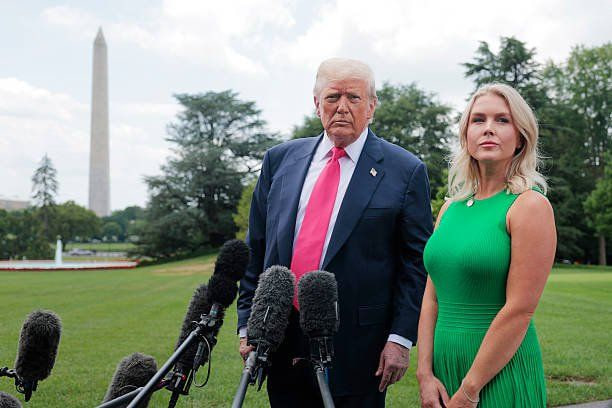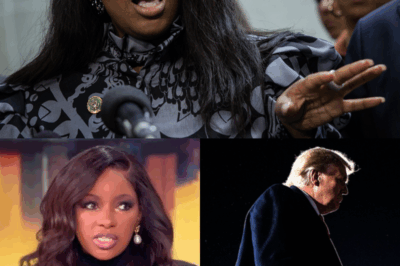In the ever-theatrical world of Donald Trump’s post-presidency, the line between reality and absurdity is often blurred.
But even by the standards of Trump’s most loyal surrogates, Karoline Leavitt’s recent campaign to secure him a Nobel Peace Prize takes the spectacle to new, dizzying heights.
Her relentless lobbying of the Nobel Committee, paired with a laundry list of dubious claims about Trump’s “peacemaking” exploits, has ignited ridicule, confusion, and a renewed debate over truth in American political discourse.

Leavitt, a former White House communications staffer and now a prominent Trump spokesperson, has become the latest lightning rod in the ex-president’s ongoing quest for international validation.
Her appeals to the Nobel Committee are not merely enthusiastic—they are fantastical.
According to Leavitt, Donald Trump is not just a peacemaker, but the architect of a new world order, having resolved conflicts that have vexed diplomats for decades.
She claims, with a straight face, that Trump brokered peace between Israel and Iran, Rwanda and the Democratic Republic of the Congo, India and Pakistan, Serbia and Kosovo, Egypt and Ethiopia, and even Cambodia and Thailand—all on his watch.
The reality, however, is far more complicated—and far less flattering.
Let’s begin with the most outlandish claim: peace between Israel and Iran.
Not only did Trump not broker peace between these two bitter rivals, but his administration’s policies were defined by maximum pressure, including the withdrawal from the Iran nuclear deal and the imposition of crushing sanctions.
In January 2020, Trump ordered the assassination of Iranian General Qassem Soleimani, bringing the two nations to the brink of war.
The notion that Trump “brought peace” to Israel and Iran is not just misleading—it’s a complete inversion of reality.
Leavitt’s assertions about Rwanda and the Democratic Republic of the Congo are equally dubious.
While Trump did show interest in the region’s rare earth minerals—resources critical to global technology—he was not the architect of any peace deal.
In fact, the most recent attempts at reconciliation between Rwanda and the DRC were mediated by Qatar, not Washington.
Trump’s involvement, according to regional experts, was motivated more by economic self-interest than any genuine commitment to peace.
The treaty remains fragile, and violence continues to flare along the border.
The story is much the same for India and Pakistan.
The two nuclear-armed neighbors have a long history of conflict, but their most recent ceasefire, brokered in early 2021, was the product of back-channel talks and diplomatic maneuvering within South Asia—not a result of Trump’s intervention.
Both nations have explicitly denied any American role in the process.
Leavitt’s claims about Cambodia and Thailand, and Egypt and Ethiopia, are equally far-fetched.
In both cases, Trump’s approach was characterized by transactional threats rather than diplomacy—offering or withholding trade deals as leverage.
In the case of Cambodia and Thailand, his administration threatened punitive tariffs if the two nations did not resolve their border dispute.
As for Egypt and Ethiopia, Trump’s involvement in the Nile dam dispute was widely criticized for inflaming tensions rather than resolving them.
Perhaps the most egregious distortion concerns Serbia and Kosovo.
The conflict that tore apart the Balkans reached its bloody apex in 1999, nearly two decades before Trump took office.
While tensions have flared periodically since, Trump’s much-touted “normalization” agreement, signed in 2020, was largely symbolic and did little to address the underlying issues.
The idea that Trump prevented a new war in the Balkans is, at best, a wild exaggeration.
Leavitt’s willingness to peddle such fictions raises uncomfortable questions about the nature of political loyalty in the Trump era.
Her devotion is not to the truth, but to Trump’s narrative—a narrative built on bluster, bravado, and a relentless refusal to acknowledge inconvenient facts.
It’s no wonder, then, that Trump himself is more enamored with her lips than her intellect; as long as those lips are willing to repeat whatever he wishes, the truth becomes irrelevant.
The spectacle of Leavitt’s Nobel campaign is, in many ways, a microcosm of the broader crisis facing American politics.
In an age of misinformation, the ability to spin fantasy into fact has become a prized skill.
Trump’s supporters are not alone in this; the temptation to rewrite history is a bipartisan affliction.
But rarely has it been done with such brazen disregard for reality—or with such a transparent desire for personal and political validation.
The Nobel Peace Prize, for all its flaws and controversies, is meant to honor those who have made genuine strides toward peace and reconciliation.
Past recipients have included Nelson Mandela, Malala Yousafzai, and Martin Luther King Jr.—individuals whose legacies are defined by courage, sacrifice, and a willingness to bridge divides.
To suggest that Trump belongs in this company, based on a series of manufactured achievements, is not just laughable—it’s an insult to the very idea of peace.
Yet the spectacle continues. As Leavitt badgers the Nobel Committee, Trump’s supporters cheer, convinced that their champion is being denied his rightful place in history by a hostile global elite.
The facts, it seems, are beside the point. What matters is the performance—the ability to command attention, to dominate the news cycle, and to keep the faithful engaged.
For those outside the Trump orbit, the episode is a reminder of how far American political culture has drifted from reality.
The truth is not a matter of opinion, nor is it subject to negotiation.
Peace is not achieved by bombast or by threats, but by patient diplomacy, mutual respect, and a willingness to confront hard truths.
In the end, Karoline Leavitt’s campaign for Trump’s Nobel Prize is destined to fail.
The Nobel Committee, for all its diplomatic delicacy, is unlikely to reward fantasy over fact.
But the episode will linger as a cautionary tale—a testament to the power of mythmaking, and to the enduring appeal of leaders who promise the impossible.
As the world watches, one can only hope that the next generation of leaders—and their spokespeople—will value truth over theatrics, substance over showmanship, and real peacemaking over the empty pursuit of glory.
News
💔 “SHE DIDN’T PLAN TO BE A HERO — SHE JUST COULDN’T WALK AWAY.” 🌧️ When Rachel Maddow landed in Jamaica to cover the aftermath of Hurricane Melissa, she expected devastation. What she didn’t expect… was her. A little girl, barefoot in the wreckage, clutching a soaked teddy bear and whispering one word: “Mama.” Reporters looked away. Cameras kept rolling. But Maddow — silent, trembling — stepped forward. That night, she stayed. Days later, she signed the papers that changed both their lives forever. Now, as the world reacts to her unexpected act of love, one haunting question remains: Was this journalism… or destiny?|KF
1. The Storm That Took Everything The storm had no mercy. Hurricane Melissa tore through Jamaica with winds that howled…
😱 “NO CAMERAS. NO PRESS. JUST ACTION.” 💥 When Hurricane Melissa left Jamaica in ruins, everyone expected statements — not silence. But that night, Rep. Jasmine Crockett made a call no one knew about. Hours later, a private shipment — blankets, medicine, and water filters worth $500,000 — quietly left U.S. soil. No press release. No credit. Just a note inside the first box that made rescuers burst into tears. Now, the world wants to know: what did she write?|KF
When Hurricane Melissa finally loosened its grip on Jamaica, what remained was not silence but the faint hum of survival…
💥 “THE TAPES WERE NEVER MEANT TO LEAVE THE BUILDING.” 😳 A Turning Point USA insider has come forward — and what they just leaked about Erika Kirk and the Chief of Staff is sending shockwaves through conservative media. Behind closed doors, secret recordings. Late-night meetings. Deleted emails that someone thought were gone forever. And now, the story is unraveling — faster than anyone can contain it. The insider’s confession doesn’t just expose one scandal… it hints at a network of cover-ups stretching far beyond TPUSA. 👀 Either way, the receipts are coming — and they could change everything. 👉 Full leaked details in the comments (CMT) before they disappear… 🔥👇👇|KF
Late last night, an anonymous insider from Turning Point USA (TPUSA) dropped a bombshell that has sent shockwaves through conservative…
“LIVE MELTDOWN ON NATIONAL TV” — WHOOPI GOLDBERG’S EXPLOSIVE MOMENT LEAVES ‘THE VIEW’ IN CHAOS 😱💥 It started like any other morning at The View. Laughter. Headlines. Controlled chaos. Then — a single note changed everything. As producers slipped Whoopi Goldberg a message mid-segment, cameras caught something no one was supposed to see. With a glare sharper than a knife, she snatched the paper, ripped it to pieces, and tossed it aside — live, unedited, and on national television. The studio froze. Her co-hosts went silent. Viewers at home could feel it — that thick, electric tension pulsing through the screen|KF
Inside Whoopi Goldberg’s Live Meltdown — and the Crisis Shaking Disney’s Daytime Empire It started with a folded piece of…
💥 “NO CAMERAS. NO PRESS. JUST THREE NAMES THE WORLD THOUGHT THEY KNEW.” 🌪️ When the Category-5 monster Hurricane Melissa tore through Jamaica, help was nowhere in sight. Then — without a single announcement — a private jet touched down at dawn. Inside: Rachel Maddow. Stephen Colbert. Joy Reid. No sponsors. No cameras. No entourage. They brought 5 tons of food, medicine, water filters, and $1.5 million in aid, all paid from their own pockets. Locals said they worked through the night — lifting boxes, feeding children, treating wounds — not a single word about fame or press. And when a volunteer asked why they came, Joy Reid quietly answered: “Because the news doesn’t need to cover this — humanity does.” By morning, they were gone. No selfies. No headlines. Just whispers spreading across the island — “Were those really them?” Nobody knows who leaked the flight manifest. But one thing’s certain: this wasn’t charity. This was rebellion — against the silence of comfort. 🕯🌎 👇 Full uncovered story before it disappears…|KF
No cameras. No sponsors. Just three journalists who decided to act, not speak. When Hurricane Melissa struck Jamaica — the…
End of content
No more pages to load












